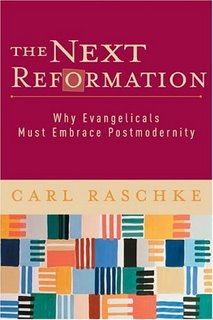 Review / Critique:
Review / Critique:If you are a Christian interested in philosophy (as the Militant Pacifist is), and if you have become convinced (as the Militant Pacifist has) that 21st century evangelical Christianity is thoroughly Hellenized, then you should find this book interesting.
This is a mostly "academic" work (i.e., it is not “light” reading), but even if you have not read much philosophy you can wade through it if you keep a philosophical dictionary close by.
Strengths:
(1) Raschke has a Ph.D. from Harvard University, and his analysis of the history of Western Philosophy (and its impact upon Christian thought) is very well-argued. The Militant Pacifist has been disillusioned with many recent Christian writers who seek to criticize “Postmodernism” without really understanding it (i.e., they have read none of the primary texts – and react with a fundamentalist zeal – full of fire, but without knowledge). This is easily understandable – since reading Jacques Derrida is almost as relaxing as a root canal. But the “Christian bookstore” definition that “postmodernism=relativism,” is simply un-scholarly. Raschke has read Derrida, Foucault, Levinas, et. al. (where was Lyotard?), and does not fall into to the “simplification” error of many recent popular Christian writers.
(2) Raschke recognizes that the modernistic quest for “certainty,” is a Western idea with philosophical roots in the foundationalist thought of Descarte. For an easier to read analysis of this issue read Lesslie Newbigin’s, Proper Confidence: Faith, Doubt, and Certainty in Christian Discipleship, (this is a great little book, http://www.amazon.com/gp/product/0802808565/sr=1-1/qid=1145588003/ref=sr_1_1/002-4823991-7848833?%5Fencoding=UTF8&s=books). Raschke pummels this idea relentlessly using Derrida as the hammer (and Derrida is a great hammer!). Christianity is not about “certainty,” (the perpetual quest of Western Philosophy), it is much more existential – it’s about faith.
Weaknesses:
(1) Raschke disparages “propositional truth.” He analyses and quotes the theologian Cornelius Van Til extensively, while neglecting the greater 20th century Philosopher Gordon H. Clark. Raschke scathingly critiques Francis Schaeffer, while embracing the irrationalism of Kierkegaard (Kierkegaard is an interesting writer, but he wasn't a Philosopher – and he never claimed to be - he repeatedly said "I'm a writer"). In the Militant Pacifist’s opinion, to criticize “propositional truth,” is to beat one's head against a stone wall (i.e., it is an unrewarding and painful activity which makes the “criticizer” look foolish). Contrary to John Armstrong’s recent ramblings (see his BLOG, http://johnharmstrong.typepad.com/john_h_armstrong_/2006/03/how_important_i.html), propositional truth is not at risk at all - and "propositional truth" is not "hard to understand." Propositional truth will be standing long after its critics have returned to dust and ashes. Not only are propositions NOT hard to understand (contrary to what Armstrong says), the Holy Bible (the Word of God) is written in propositions; predications. When Raschke embraces irrationalism, he slips, he slides – he looses ground (grounding, credibility). Raschke is extremely intelligent, so the reader must understand that his embrace of irrationalism is not accidental; his sustained attack on foundationalism (and his method of attack) traps him in irrationalism.
(2) Raschke embraces Charismatic foolishness. This is the hardest to swallow. In the next to last chapter of the book, this Harvard Ph.D. documents how (emotionally weakened by a failed marriage) he experiences a charismatic phenomena in a Dallas, Texas meeting, and is forevermore changed into what Brian Maclaren calls “a new kind of Christian.” For the orthodox thinking Christian who has experienced Christ as the "wisdom of God" – this leap into irrationality/foolishness is astounding. Wake up man – you are better than this!
Conclusion:
This is a very interesting book. It is generally well written, and if I could delete about 20 pages (out of 215) I would give it 5 stars. As it is, I will give it only 3. I can only recommend it for thinking Christians who are attracted to Postmodernism (as the Militant Pacifist is). It is educational and well written, and may serve as a warning of the foolishness that can follow when one embraces irrationalism and calls it “Christian.”

+001.jpg)



No comments:
Post a Comment